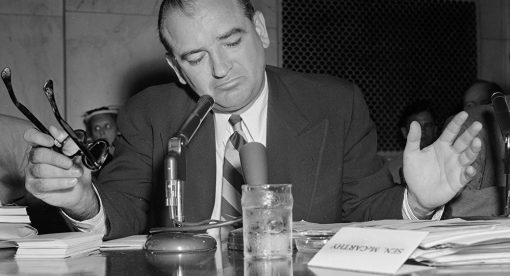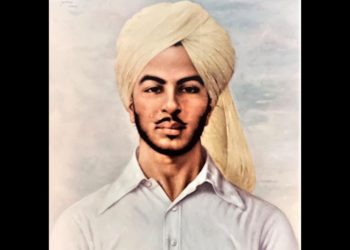
With lightning speed, to manufacture consent for the Modi-Shah duo in their rush to 2019, now comes the proposal to control online media through a bureaucratic hastily set up committee. In an era where new style Indian McCarthyism has come into play, it is yet another move to manufacture consent in an atmosphere where opposition to the government is mounting amongst the intelligentsia, academic institutions, teachers , students, dalits, minorities and trade unionists among others.
Call it what you will – new witch hunt or McCarthyism-Indian-style. McCarthyism of the traditional type was there in India too – in the 50s and 60s in some of our campuses and in states developing a leftist tradition. What is now taking place however is a new wave of witch-hunting and creating a climate of intolerance not only against the traditional left but against all forms of democratic dissent bringing into mind Jean Paul Satre’s famous statement of the sixties “Fascism is not defined by the number of its victims, but by the way it kills them.” Ominous signs indeed are emerging.
First, in the past few days media has emerged as a special target. Consider some very recent facts. The information and broadcasting (I&B) ministry has decided to constitute a committee to frame rules to regulate news portals and media websites. The order was circulated on Thursday. It should be noted that earlier ripples were felt in Goa as the Goa Legislature Secretariat’s “Guidelines for the Accreditation of Media Organisations and their Representatives” laid down multiple criteria for reporters seeking admission to the Goa Legislative Assembly’s press enclosure. Journalists have described these as draconian. On Monday, the Goa Union of Journalists said it was “horrified” by the guidelines. It said the guidelines hit out at freedom of speech and the right to be informed. They were “designed to block access for a majority of media houses and their representatives for covering the assembly”, the statement alleged.
Meanwhile on 3rd April, just as a National Alliance of Journalists (with the Delhi Union of Journalists a major partner) was getting set for an all India vigilance day against concerted moves to gag the press and their trade union rights , and the Press Club of India , the Indian Women Press Corps and a Federation of Press Clubs of India were set for a solidarity meeting in the evening along with Editors Guild of India, the government of India made a ‘tactical retreat’ in a damage control operation by virtually withdrawing what was called in some circles as I & B Minister Irani’s ‘punish-journalists directive’ .
In the backdrop lies the historical facts that governments in the past had to withdraw even the draconian emergency and press censorship in 1976, the Bihar Press bill 1982 , the Jammu – Kashmir bill , the POTA and only recently in 2017 the Rajasthan government’s ham handed attempts to curb the press. All this has to be seen in the present atmosphere of witch-hunting of journos, intellectuals, teachers , writers and artists known to differ with the government or agitating for their democratic rights . In New Delhi, in a sharply worded statement on Tuesday 3 April,2018, the Editors Guild – comprising current and former editors of various media organizations also came out against the attempt to push new government guidelines for media accreditation that would have led to the suspension of official facilities for journalists accused of publishing “fake news” .Though the Prime Minister’s Office on Tuesday withdrew the I&B ministry guidelines issued on Monday and said it would be up to the Press Council of India (PCI) to formulate new rules, the Guild and others questioned the continued faith reposed by the government in the PCI.
Media Controls
The attacks on the press have to be seen in the wider context of a new wave of Indian style McCarthyist attacks on media and followed by repressive anti-union, anti -farmer, anti dalits and anti-minorities intolerance. As far as the Government’s statement goes it should be noted that the PCI has been arbitrarily restructured, the accreditation committee and even welfare committees of the government too packed with chums of the Government. Furthermore the Press Council lacks teeth and the broadcaster’s body too is represented by editors and key buddies not journos. There is no media council of journalists based on merit or giving weightage democratically.
In fact as has been pointed out by various scholars too, what is catching on in India too is a new form of McCarthyism where not only is there witch hunting but at times brute killings of opponents some of whose views do not suit the powers that rule.
Signs of attempted witch-hunts are there from Gujarat too. It is understood that recently “A senate member of M S University (MSU) of Baroda on Monday called for barring “Communists” from getting admission to the university lest they “break Gujarat into pieces”. Speaking at the annual meeting of the senate members, Hasmukh Vaghela demanded suspension of two students of Institute of Leadership and Governance of the MSU who have been allegedly rusticated following their meeting with former JNU students’ union president Kanhaiya Kumar. Vaghela’s comment was seconded by other senate members who showed their support by banging the benches. Vaghela also emphasized on a thorough background check of students before admitting them in the university. “I have background details of the student in question, which is why I am making this remark. The student has a Communist leaning. It is necessary to keep Communist forces away. Communists should not be admitted to the MS University. They will break Gujarat into pieces. We have never had Communists in Gujarat and we should never have them,” Vaghela, representing Department of Pharmacy, later said. However, rational voices prevailed. Calling such statements as “baseless and illogical”, MSU Registrar Neerja Jaiswal said, “A student is a student for us. We don’t even ask their religion in the admission form. How and why would we ask them their political background or political ideology. It is their choice.”
New McCarthyism Hits India
Scholars like Prof. Ramchandra Guha have been warning of new style Indian McCarthyism. Suffice it to say that in India hostility to intellectual is being whipped into frenzy in some degrees and some universities more ferocious than what was there perhaps in Joe McCarthy’s USA. Concrete examples are the killings of Narendra Dabholkar, Govind Pasare, M M Kalburgi and Gauri Lankesh . As veteran journalist Praful Bidwai once put it several years ago: “When future scholars write the social history of this past decade in India, a major trend they will undoubtedly note is the upsurge of intolerance. Right since the Babri mosque was demolished in December 1992 by a frenzied mob out to settle scores with history, there has been unrelenting violence, discrimination, and humiliation against groups of people (including journalists)”. Perhaps the most pernicious aspect of the new intolerance is the official sanction it receives through ministers and leaders of academic institutions which have been unscrupulously and ruthlessly saffronised, including universities, councils of historical and social science research, and the National Council for Educational Training and Research. It was at that time too that the then Human Resources Development Minister Murli Manohar Joshi, opined "I want to teach students a history of Indian successes and victories and not of subjugation and defeats." Indeed, in present times, history teaching texts have gone through a sea change as has advance of scientific temper, once insisted upon by the Press Commission of India.
Scholar Partha Chatterjee in 2016 had cautioned that there is something ominously new in the manner in which the attack against freedom of thought and expression has been launched this time. He aptly put it in Scroll.in that he could not remember, except for the period of the Emergency in 1975-77, a national campaign that asserts that certain political questions cannot even be talked about in the university. Are we to accept that national loyalty must be so unquestioned that the origins and present status of the nation and its boundaries, the nature of the constitution and the laws, the mutual relations between different regions and cultures, the demands of oppressed peoples and minority groups, cannot even be discussed and debated among students and teachers? What is happening in India today is similar to the McCarthy era. Whether the alleged “anti-national” slogans were raised on the campuses of Hyderabad University or JNU by those who have been charged is, of course, important for the future careers of those students – for Rohith Vemula the matter is, tragically, beyond rectification.
Speaking of fake rumours, think of Muhammad Akhlaq, the farmer who lived in Bishada village, Dadri in Uttar Pradesh. On the evening of 28th September 2015 a fake rumour was announced through a temple's public announcement system that Muhammada Akhlaq and his family has killed a cow (considered holy by upper caste Hindus) and consumed its meat on Eid- ul-Adha. At around 10:30 p.m. a Hindu mob gathered outside his house dragged him and his son outside and started beating them mercilessly. They killed Muhammad Akhlaq and left his 22 year old son Daanish seriously wounded. The news spread across the country and was condemned by all sections of the society. The main accused Vishal was revealed to be the son of local leader Sanjay Rana of the ruling Bharatiya Janata Party (BJP). 7 of the 10 accused in the lynching belonged to the family of Sanjay Rana.
There are indeed dangerous portents but also new political alignments and mass movements emerging that could well prove what esteemed journalist Nikhil Chakraverty once said; ”There is never a never-in-India politics.” New facets of McCarthyism could well meet the same faith as the old. It was in the Delhi University in the 60s that witch hunting slogans were put up in Macbethian witches style, opposing the late Dr. K N Raj as the vice chancellor. Posters also listed the type of vice chancellor required. Not only did Dr. Raj , become the vice chancellor but he helped in the democratisation of the Delhi University and its colleges. Of course a strong teachers’ movement consolidated the process and right wing forces were stalled.




